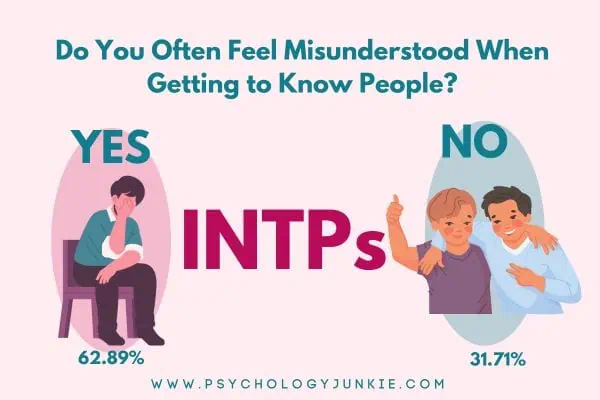The INTP Struggle Against Narrow-Mindedness
Have you ever found yourself sitting in a conversation, listening as people nod in agreement to a statement that doesn’t quite add up? Maybe it’s a sweeping generalization, a contradiction, or just plain nonsense masquerading as truth. You resist the urge to let it slide. The gears in your mind whir. Questions form. Is it logical? Is it coherent? Does it hold water? If not, you feel compelled to say so.
Sometimes this works out. People change their thinking and people make more sense. Often people look at you with a reproving glare, questioning why you’re “nitpicking.”

Such is the life of an INTP. I’ve seen this time and time again as an MBTI® practitioner. INTPs serve the world by rooting out bias, inconsistency, and “groupthink.” Yet again and again they are chastised for it socially. It’s not easy.
You’re on a relentless quest to cut through the clutter of narrow-mindedness and replace it with clear, consistent reasoning. It’s not about showing off your intelligence or proving others wrong. It’s about the principle of understanding. Truth matters. Clarity matters. And you’re willing to challenge long-held beliefs to get there.
The INTP Mindset: Rooted in Logic, Fueled by Curiosity
At the heart of the INTP’s mission is Introverted Thinking (Ti). Ti isn’t just about thinking—it’s about thinking well. As Dario Nardi, a UCLA professor and expert in neuroscience, explains:
“Introverted Thinking aims to think in clearer, more consistent ways. It’s about expertly solving problems with pinpoint leverage. It’s about refining your understanding of life’s principles.”
Introverted Thinking wants to understand all the nuts and bolts of how something works and why. It’s not just interested in USING a thing, it’s interested in understanding the thing.
This drive for precision leads INTPs to question everything, from societal norms to scientific theories to their own assumptions. Combine that with Extraverted Intuition (Ne), and you’ve got a type that not only challenges narrow-mindedness but also finds innovative solutions and connections where others see dead ends.
David Keirsey, author of Please Understand Me, describes INTPs’ unique perspective:
“Authority derived from office, position, or wide acceptance does not impress INTPs. Only statements that are logical and coherent carry weight. External authority per se is irrelevant.”
If an idea doesn’t make sense, you feel compelled to point it out. And that takes bravery. I (an INTJ) have found myself in situations where I’ve kept my mouth shut when there was a logical inconsistency, just because I knew it would unleash a firestorm of conflict if I pointed out the error. Sticking up for accuracy can be wildly challenging in a world where most people just want to talk in an echo chamber.
Inspiring INTPs Who Challenged the Status Quo
Some of the world’s most groundbreaking thinkers have been INTPs. These are individuals who refused to accept the status quo, who looked at the world’s complexities and said, “There’s more to this story.”
Albert Einstein, for example, famously declared:
“A foolish faith in authority is the worst enemy of truth.”
Einstein’s willingness to question Newtonian physics led to the theory of relativity, fundamentally altering our understanding of space and time. Imagine the courage it took to challenge such deeply entrenched ideas. Yet Einstein wasn’t driven by rebellion. He was driven by curiosity and a need to understand the universe with clarity and precision.
Charles Darwin, another INTP, spent decades studying nature before publishing On the Origin of Species. His theory of evolution faced intense backlash, with many scholars but Darwin’s commitment to evidence and logical reasoning helped transform biology forever.
Then there’s Hannah Arendt, the political theorist who delved into the nature of power, authority, and evil. Arendt’s work challenged societal norms and raised profound questions about human behavior, ethics, and politics. Her fearless intellectual curiosity embodies the INTP’s drive to illuminate truth in a murky world.
But like I’ve already stated, it’s not easy being a truth-teller. In fact, Charles Darwin’s concerns over how his ideas would be received by the broader public led him to wait more than 20 years to publicize them. 20 years of uncertainty.
People sometimes stereotype INTPs as being brazen, insensitive, debaters who couldn’t care less about people’s feelings. The truth is far more nuanced. INTPs do care about people’s feelings, they just don’t know what to do with them because they’re not logical. And one of the ways that INTPs show they care is by clarifying information. To them, this is deeply caring. But others often see it as simply argumentative.
Fighting Narrow-Mindedness in Everyday Life
You don’t have to be Einstein or Darwin to challenge narrow-mindedness. As an MBTI® practitioner, I’ve seen countless INTPs tackle this in their everyday lives. One of my clients worked as a software engineer. His team used a bunch of outdated coding practices because it was what they knew, and it’s hard to change. It’s a lot easier to stick with muscle memory and the things we already know as humans. But at a certain point it bogs down everything and makes it harder to make a real impact. My client analyzed the system, identified inefficiencies, and proposed a streamlined solution. It wasn’t easy—some team members resisted the change—but Jack’s persistence ultimately improved the entire workflow.
Another client, a philosophy professor, shared how she regularly challenges her students to question their assumptions. She faces some backlash in her classes from students who take offense to her hard-hitting approach. She told me about a debate in her class on free will vs. determinism. Rather than lecturing, she asked probing questions that forced students to examine their beliefs from every angle. The result? A room full of young minds thinking more critically and creatively.
The Struggles of Challenging Narrow-Mindedness
Let’s not pretend it’s always smooth sailing. Being the person who questions everything can be exhausting. You’ve probably faced resistance, frustration, and even ridicule for your efforts. People don’t always appreciate having their beliefs scrutinized—especially when they’ve never had to justify them before.
One INTP I worked with, a high school student, shared how her teachers often dismissed her questions as “disruptive.” She wasn’t trying to be difficult; she simply wanted to understand the reasoning behind certain rules and methods. While her peers might have accepted things at face value, she couldn’t help but dig deeper.
And then there’s the inner struggle as well. INTPs are their own harshest critics. You don’t just challenge others—you challenge yourself, constantly questioning whether your ideas are sound. It can lead to analysis paralysis, a state where you’re so focused on finding the perfect answer that you struggle to act.
Why It Matters
Despite the challenges, your mission to fight narrow-mindedness is vital. As Keirsey put it:
“For INTPs, the world exists primarily to be understood…It is essential that the universe is understood and that whatever is stated about the universe is stated correctly, with coherence and without redundancy.”
You’re the person who keeps the world honest. You’re the one who asks, “Why?” when everyone else is nodding along. You’re the one who sees the flaws in a plan, the inconsistencies in an argument, and the untapped potential in an idea.
Without people like you, we’d still be clinging to outdated beliefs and flawed systems. You remind us that progress comes from questioning, analyzing, and thinking critically.
How to Keep Going
If you’re feeling burned out or discouraged in your quest, here are a few tips:
- Pick Your Battles – Not every hill is worth dying on. Focus your energy on the issues that truly matter to you.
- Build a Support Network – Surround yourself with people who appreciate your perspective, even if they don’t always agree with you.
- Take Breaks – Prioritize regular bouts of alone time to recharge, breathe, and bolster your energy supply.
- Celebrate Small Wins – Remember that even small shifts in perspective can have a big impact over time.
What Do You Think?
INTPs, the world needs you. We need your curiosity, your logic, and your willingness to ask the hard questions. If we didn’t have you the world would be in absolute chaos. Even now I can see where a lack of logical questioning is creating difficulty today. People are too concerned with appearances, with public perception, to really ask the hard questions. Thank you for all you do to make the world a more honest place.
Find out more about your personality type in our eBooks, Discovering You: Unlocking the Power of Personality Type, The INFJ – Understanding the Mystic, and The INFP – Understanding the Dreamer. You can also connect with me via Facebook, Instagram, or Twitter!
Other Articles You Might Enjoy:
30 Day Personal Growth Challenge for INTPs
Subscribe to Our Newsletter

Want to discover more about personality type? Get the inside scoop with Susan Storm on all things typological, along with special subscriber freebies, and discounts on new eBooks and courses! Join our newsletter today!













